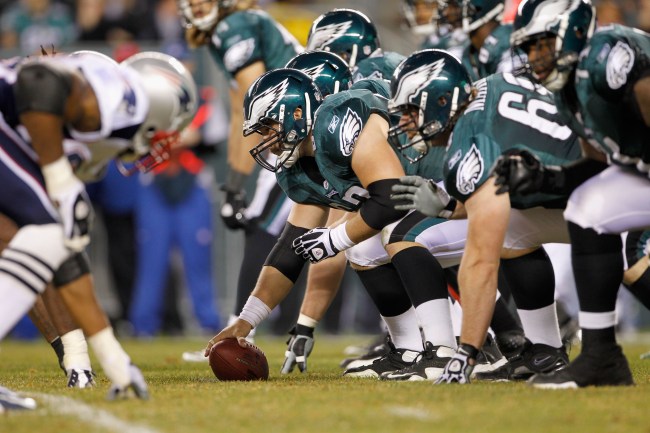
Rich Schultz/Getty Images
The Philadelphia Eagles formidable offensive line collectively weigh more than a Prius and eat enough food to give the average person second-hand diarrhea.
Left tackle Jason Peters, left tackle Halapoulivaati Vaitai, left guard Stefen Wisniewski, center Jason Kelce, right guard Brandon Brooks and right tackle Lane Johnson are a tight-knit group that dine together in expensive restaurants and require a whole wait staff to serve them.
Via Sports Illustrated’s Alex Prewitt:
Most often the group dines downtown at Del Frisco’s Steak House, where their standard order of shared appetizers includes two tuna tartars, three fried calamaris, three cheesesteak dumplings, three lobster mac and cheeses, two creamed corns, three château mashed potatoes, two asparaguses, several shrimp cocktails and (sometimes) one seafood tower. After that, everyone digs into either a 22-ounce prime rib eye or a 32-ounce tomahawk—everyone, that is, except Wisniewski, who’s been known to house both.
Hold up.
[protected-iframe id=”f53847bf0a11416c2d4d8f554857e739-97886205-37946113″ info=”https://giphy.com/embed/wGRHB8uN5nNdu” width=”480″ height=”480″ frameborder=”0″ class=”giphy-embed” allowfullscreen=””]
As far as payment goes, the group gets dramatic with it.
As a group that strives for egalitarianism, payment at these meals is typically decided via credit card roulette. Last season Kelce was dealt some terrible luck, twice getting stuck with back-to-back checks—bills that can climb above $2,000. Which seems somewhat unfair given that Kelce is the only O-line starter listed under 300 pounds. “He was fucking pissed,” reports Brooks.
If I had to pay two grand for my shithead friends to get diabetes I’d be fucking pissed too.